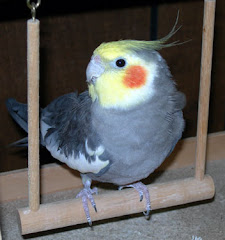Seeds, Pellets & Powders
Not long ago, many people were under the impression that a cup full of seeds and some clean water were all it took to keep a bird alive and healthy. But avian research has clearly shown that seed alone are not adequate, as seed diets lack much of the nutrition wild birds seek out from other sources, such as fruits and other plants.
To make it easier for the average owner to feed their bird a healthy diet, many companies have developed fortified pellet diets. Pellets usually carry relatively "complete" nutrition, and help prevent many diseases and conditions which can later develop as a result of malnutrition from seeds alone.
If you have a bird who has been fed only seeds, your best option is to gradually introduce pellets until only the pellets are offered. Unfortunately, this is not always as easy as it sounds, and picky eaters may refuse pellets, even if that is all that's left in their dish. Seeds contain more fat, and the birds will often find them more satisfying than pellets.
If all else fails and your picky eater completely refuses pellets, your next best option is to put vitamin powder in their water, or mix the powder with "moist" foods, such as cut pieces of fruit. Prime supplement powder is a good example of a such a product which can, again, lead to a longer and healthier life for your bird.
Healthy vs. Junk Food
Just like people, birds need healthy snacks to stay healthy. Even if your bird just loves Cheetos and Fruit Loops, believe it or not, you're not doing him any favors by handing over the salty or sugary, processed treats.
The list of unhealthy bird snacks includes:
• Salt or foods containing salt
• Products containing bleached flour
• Processed foods in general
• Sugar
• High fat items (limit nut intake)
• Chocolate
• Caffeine
• Alcohol
• Avocodos
A somewhat general rule of thumb is "if it's bad for you, it's bad for your bird." Read labels! If the ingredients read like a foreign language, it's virtually a guarantee that the product is not nutritious for anyone. Feeding your bird, and yourself, whole food items such as whole grain breads and unprocessed fruits and vegetables will keep them, and you, healthy.
Organic foods are highly recommended as well because of pesticides and other chemicals used on crops. While the outside of any type of produce can be cleaned fairly well, chemicals that go into the ground, and thus into the water table, eventually end up inside the plant as it takes up the water through its roots. Therefore, your safest bet is to buy organic when possible to limit potential toxins.
What About Water?
Many bird vets and sellers recommend bottled water for birds. This is because tap water can have traces of lead and other elements that, while they might not hurt a large human, could be deadly for a relatively small bird. It's as easy as stopping at the grocery store and picking up a gallon of spring water. It's cheap and it lasts, perhaps even a bit longer if your bird has learned to drink from a hanging water bottle.
Again, read the label to see if the water is bottled from a spring or a municipal source. A municipal source is pretty much the same as what you get out of your faucet every day, though probably slightly differently filtered.
Both water and food should be changed at least daily. Lack of food and water or dirty water are linked to behavior and health problems. For birds who love to dirty their water bowls, a hanging water bottle is recommended. This helps keep the water clean and may be changed every few days.
Proper diet is one of the easiest ways to keep your bird healthy. Check with your local avian veterinarian for more information.
Personally...
Our budgies both eventually died of gout, possibly in part because we learned too late in their lives about improved diet fortification. Both thankfully aged well into their teens, but may have lived even longer had we made additional modifications.
I highly recommend Roudybush brand pelleted food. Three of my birds were started on or switched to this brand, which doesn't include fake color additives. (Some picky eaters literally refuse to eat certain pellet colors. Rock stars!) I was actually able to use Grape Nuts cereal, which the cockatiel loved, to gradually switch him to Roudybush, which looked quite similar. Still amazed he fell for that.
I also found it quite easy to switch my Quaker from his water bowl to a hanging water bottle. This will certainly depend on the bird and how quickly they pick up on things, but I was very grateful to eliminate the "bird soup" mess he enjoyed making.






No comments:
Post a Comment